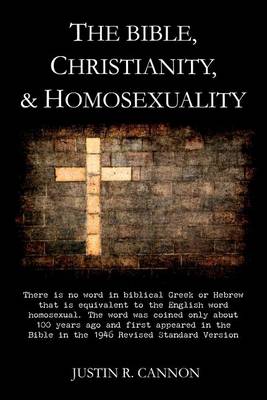
Jane
Written on Dec 27, 2017
Knowing what I know about language and translation, I started to wonder if perhaps 1) Bible translations could be biased, based on personal prejudice and societal culture; and 2) things could have been lost in translation. Translators and interpreters (for sign language) seldom take into account not to necessarily make assumptions about gender when translating, regardless of how gender-neutral many languages are. Spanish, for example, uses masculine articles for general plural statements. Without knowing context, the translation of Spanish to English via masculine articles could include all males—only males—or "them", being masculine and feminine. There are words for "them" and "they", of course—but, like we do with English, slang and laziness exists, so sometimes other words (e.g. ellos) are used in place. This is how I got into the case of the Bible vs. Christianity vs. sexuality vs. gender.
But going back to what I mentioned in the first paragraph: intersex, natural infertility, "eunuchs". Marriage is not solely procreation—if it was, then I imagine the Church would require all couples to be tested to determine whether they're fertile! So it makes no sense to me to just assume that that is all marriage is about—procreation—and that only the fertile can be married, when there are many married Christian couples out there who have been unable to produce children biologically, regardless of whatever means they have tried. I took God's "go and be fruitful"/"multiply" statements as the knowing of how 1) new life comes to form and 2) the spreading of His word. Because what is the point of all of this—life, the trials, procreating—if no one does it for Him? If no one loves God? I feel like he would've given up a long time ago.
Moreover, who are these people supposed to love? Obviously, gender is not binary. There is so much we don't know about it—and I don't believe "it's getting worse", but rather instead that we are more connected, so research is being shared and contributed to better—and more stories are being shared. We're connecting with each other more because of technology, so this information is more accessible to others in the world. Instead of going at everything alone, we're finding our community and people who understand what we're going through!
I used to have a lot of internal homophobia. I've been inside many homophobic conversations. There is no love in loving the sinner, but hating the sin—not in regards to homophobia. Or, really, homomisia. Because homophobia is a fear, and it's not a fear we're talking about when we discuss the Church and homosexuality (or any sexuality/gender identification). It is pure disgust coming into play, which breeds and encourages hate. It is opinion-based, personal prejudice that comes into play in regards to disgust. If there was love, shouldn't it be similar to that of Christian couples divorcing each other?
While shopping with one of my cousins, a couple of two men walked past us, holding hands. They were friendly. I smiled at them. She, on the other hand, turned up her nose and made gagging noises. "I don't know why people have to be so disgusting," she said. "That's just so gross." Gross. What's gross is going under a trailer home between that awkward autumn/winter transition to rescue stray kittens before the snow falls, only to come out with your body covered in dead bugs and mud, and your lips containing something soft—not fur: spider webs. And some of the mud is animal droppings. But someone can totally come along and tell me that that isn't as gross as swimming in a new, muddy lake as a kid or having to pull a tiny shard of glass out of their foot.
From my experience of being on the homomisia side of the conversation, I surmise it's less about what the Bible says and more about the 1) sexualizing of everyone and everything in the Church and 2) imagining, as a heterosexual person, how homosexual people have sex. Because, at the end of the day, that's it: homomisics can't bear to think about "butt sex", as they call it. "I just find it unnatural," they say. But for people whose identity is not heterosexual, sex between a man and a woman could feel unnatural to them—wrong, even, as if they're forcing themselves to be assaulted/raped just to avoid persecution.
I don't read between the lines. I'm autistic. I stopped with my homophobia and homomisia some months after I lost a gay friend of mine to suicide—because he was bullied for being gay. I grew up [somehow] always running into, and thus watching, movies about how dangerously hateful homomisia and transmisia are—almost as if a patient God was carefully crafting a recipe for this understanding of mine. I feel weird saying that, because I feel like an armchair psychologist is going to diagnose me with Special Snowflake Syndrome, but based on where I come from, I should have grown up to be a hateful, spiteful, abusive person—and I didn't. I don't know precisely, or even understand, how I didn't, but...I didn't. I don't think my understanding is only available to me, either—it's one that seems so widely available, if only we stopped for a moment to acknowledge the possibility. Because anything is possible with God.
The hateful paradox of the Church is what drove me away from it—and thus my faith—but I'm back, working on it and working to understand myself and the life around me. But I don't follow the Church—I follow Jesus. I'm so disgusted by the hate of humanity all over the world. I've seen too many people die at the hands of the Christian religion because hating "the sin" overpowered that of loving the person. At the end of the day, it feels more like the Church has created a box with a checklist that only certain people are allowed to get into—as if you can't love God with all your being and feel like being with men is the most unnatural, rapey thing in the world. The box feels more like a witch hunt than an act of love.
I rated this 4/5, because while it appeared to have been edited, there were multiple punctuation typos.
